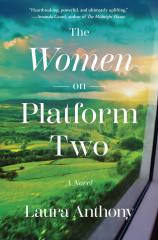The Women on Platform Two
Review
The Women on Platform Two
There are three female protagonists in Laura Anthony's THE WOMEN ON PLATFORM TWO, and they couldn't be more different.
The story opens with Saoirse in 2023, finding out that she is not pregnant. She is relieved, unlike her fiancé, Miles. While Saoirse doesn't want to be a mother, Miles is desperate to have a child with her. They cannot reconcile their differences, and she leaves the apartment after they argue. She accidentally ends up on a train headed for Belfast as she returns a photograph to an elderly woman named Maura, who dropped it in the station. The train leaves before Saoirse can get off, so she joins Maura. Maura is making her annual pilgrimage to Belfast, and she tells Saoirse the story of why, every year on May 22nd, she travels from Dublin to Belfast on this train.
It's in commemoration of the first trip Maura took, in 1971, to demonstrate that the Irish women demanded the right to contraception. While most of the rest of the world, including Northern Ireland, could freely purchase condoms, get a prescription for the pill, or use a diaphragm, it was illegal in the Republic of Ireland.
"This book isn't dry history. The narrative grabs us from the first page... THE WOMEN ON PLATFORM TWO is a thoughtfully written story that will shock readers who have been unaware of how recently it was that women were so powerless."
Maura relates the tale from her own point of view and that of her best friend, Bernie. She takes Saoirse back 50 years as she describes their lives. Maura and Bernie came from very different backgrounds, and their situations were not comparable. Maura worked for a fashionable, expensive department store before meeting her husband there. Dr. Christopher Davenport, nicknamed Christy, was successful in every meaning of the word. He had a lovely home in an exclusive part of Dublin, he was respected by other doctors and his patients, and he was quite handsome. He seemed to have it all, and he was in love with Maura. She loved him in return, and we read about their courtship. By all accounts, they should have had an ideal marriage.
But when Christy's violent nature appears, it's as shocking to us as it is to Maura. These days, we read about domestic violence in the news; it's a crime to beat or rape one's wife. Back then, especially in conservative Ireland, no one wanted to know what went on behind closed doors. A wife was her husband's possession. She had no rights. He literally could do whatever he wanted to her, and no one would intervene. So Maura was on her own.
Bernie, on the other hand, married a butcher. While they didn't live in a posh part of town but rather over the butcher shop, her husband, Dan, was a loving spouse and a caring father. Unlike most men during that time, he didn't care that they didn't have a son, and he adored their three girls. He respected Bernie, and their marriage was a model of equality.
While we know from the start that the book is going to be about an auspicious event for women's rights, most of the story is about Maura and her marriage and how it contrasts with Bernie's. Along the way, Anthony makes clear just how subjugated women were in Ireland. If a girl found herself pregnant, either from rape or a boyfriend, she was shunned.
Many died on the streets, tried to obtain an illegal abortion, or were sent to a home for unwed mothers, where they were horrendously mistreated and never saw their babies. It seems that the latter was practically the worst choice of all because of the abuses to which the pregnant women were subjected. And when a married woman was told by her doctors that she shouldn't have more children due to physical problems, the sole option was for the couple to refrain from sexual relations for decades. Abstinence was the only reliable method of birth control that was legally available.
An interesting piece of dialogue is when Maura says, "My body, my choice." Women had no choice as to whether or not to have children, and they had no control over how many they had. When it was dangerous, possibly fatal, to bear a child, even then they had no choice. All methods of birth control were illegal.
Maura's fight --- and the fight of women during that time, only a little over 40 years ago --- displays sad prophecies of what women are fighting for today. After 50 years of Roe v. Wade, women in the U.S. have lost their right to an abortion. Now there are many states that have made getting an abortion illegal, even in cases when the mother's life is at risk. Women state, "My body, my choice." States that make obtaining certain types of birth control more difficult seem to be taking us back to this time in Ireland when women were banned from working after marriage, weren't allowed to own property, and depended on their husbands for everything. Women were nothing more than "baby makers" and housekeepers. It's a sentiment that can feel all too current.
This book isn't dry history. The narrative grabs us from the first page as we follow Saoirse to the train station and see her pick up the fallen photograph and rush to return it to Maura. Maura's touching story of her and Bernie's lives, and how they became involved in the women's movement, is compelling. We meet several women who are determined to further the cause, each for a different reason. It's a beautifully crafted novel filled with admirable women who strive to overcome the prejudices and prohibitions of their time.
THE WOMEN ON PLATFORM TWO is a thoughtfully written story that will shock readers who have been unaware of how recently it was that women were so powerless. It's also a cautionary warning about the direction that our country is taking --- holding the life of a fetus as more important than that of the mother. Just as women in Ireland 50 years ago were not allowed to have control over their bodies, many pregnant women now have lost control over theirs. Laura Anthony will make readers think carefully about the road that women trod to gain those rights and how easy it is for them to evaporate.
Reviewed by Pamela Kramer on March 15, 2025
The Women on Platform Two
- Publication Date: January 6, 2026
- Genres: Fiction, Historical Fiction, Women's Fiction
- Paperback: 368 pages
- Publisher: Gallery Books
- ISBN-10: 166804739X
- ISBN-13: 9781668047392




